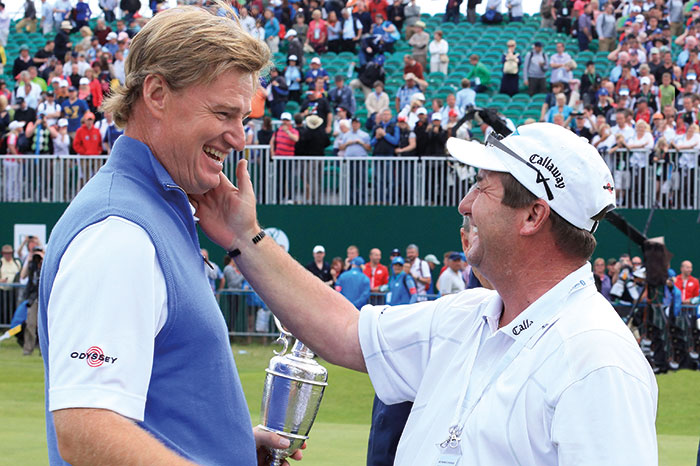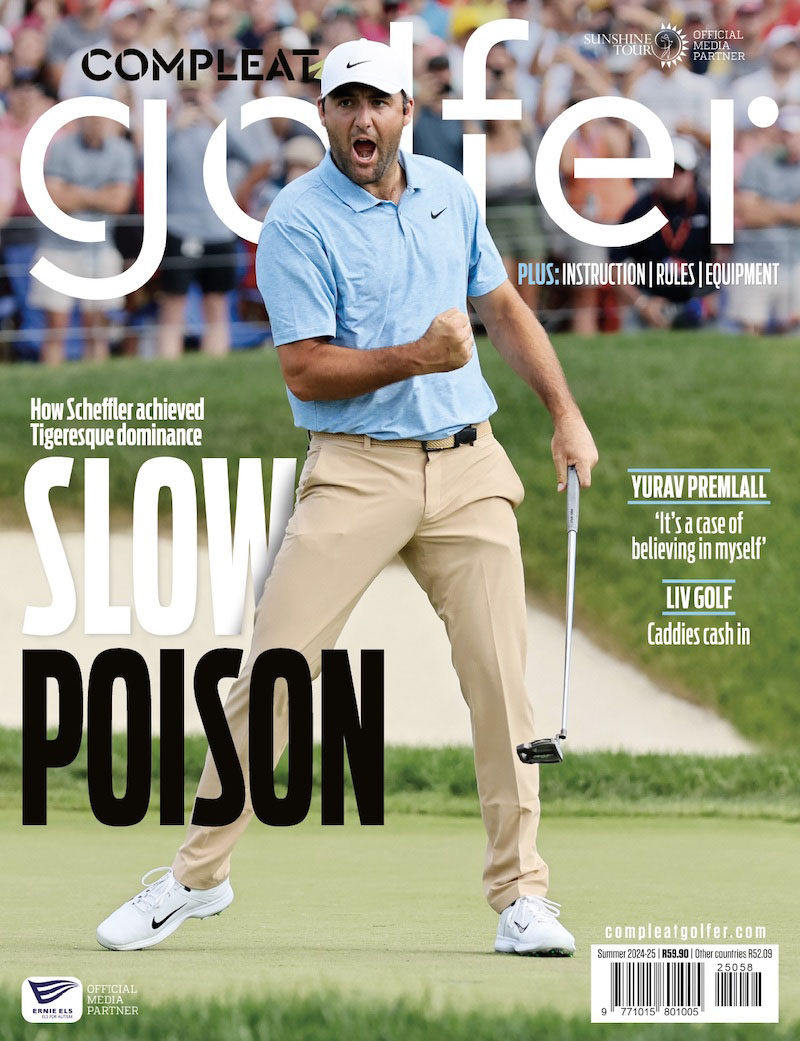By Michael Vlismas
‘We make Liz Taylor and Richard Burton look like novices in terms of how many break-ups we’ve had … But we’re like family. I’m closer to him than my own brother’
In one sentence, Ricci Roberts sums up everything you need to know about what it takes to be a world-class caddie.
‘When your man needs to let off some steam and vent, do you think he’s going to be able to do that if it’s his wife, girlfriend, or friend on the bag?’
With that question, Roberts makes it quite clear this is a serious business beyond just having somebody to carry a golf bag, and that the man swinging the clubs comes first. All the time.
Having spent 27 years as Ernie Els’ caddie, friend, punch bag, brother and psychologist, Roberts remains a fan of the job he does and the man he works for.
‘I know for a fact there was only one guy Tiger Woods ever feared and that was Ernie Els. I know it for a fact,’ he says.
‘Tiger never feared Mickelson or anybody else. He feared Ernie. He knew Els was a great player. Els had the best swing on the planet. For me, and I think most people would agree, Els had more natural talent than Woods did. Woods just had a mind nobody’s ever seen before.’
But having a front-row seat to the best part of Woods’ career is something Roberts feels extremely privileged to have witnessed.
‘I consider myself among the most fortunate people on the planet to be in that era with Tiger Woods. We played with him hundreds of times and to see it unfold in front of you was amazing. The guy was a freak. If he hadn’t been around, how many Majors would Ernie have won? Probably 12. Who knows? At end of day we were in that era and had to deal with it.
‘I mean, the way Woods putted in 2000 and 2001, nobody has ever putted like that in the history of this game. Maybe Jordan Spieth last year. But Tiger’s putting in 2000 and 2001 was the best I think we’ve ever seen.’
Roberts is as impressed as most of us with the new talent in the game, but he does have reservations.
‘There’s a lot of talent around. Jason Day’s record over the past 10 months has been phenomenal. And Spieth is a great talent. There’s no fear any more among the youngsters. We also have serious talent in South Africa. Branden Grace is not scared. He’s had a taste of the Majors and I think if he wins one he’ll win a few. But it’s a question of how badly do they want it.
‘You know, some guys are too comfortable making five to 10 million dollars a year. That’s cool with them. They bring it home and it’s almost 20 to one and they say, “I’ll take a month off”. It’s too easy.
‘The great thing with Ernie is he always wanted to be the best and pushed himself to the limit. He knew that if he was the best, the rest would take care of itself. I also think technology has taken something away from the really great players and brought everybody closer together.’
Roberts has worked with Mark McNulty, Nick Price, Lee Westwood, Charl Schwartzel and Trevor Immelman. If he could choose one bag he would’ve also loved to carry, it’s that of Adam Scott.
‘One of the nicest guys on the planet. He’s an absolute gentleman and he can seriously play. I would’ve loved that bag.’
But it’s been his time with Els that he will forever be remembered for, and they will go down as one of the great player-caddie relationships in the history of golf.
‘Ernie and I have always had this love-hate relationship, but the chemistry is right there. And I think the record speaks for itself. As much as he and I like to have a good time, the golf course is business.
‘Look, we’ve been around each other for nearly 27 years. We make Liz Taylor and Richard Burton look like novices in terms of how many break-ups we’ve had. I’ve had more comebacks than Frank Sinatra. Sure, we’ve had our shouting matches. But at the end of the day we’re like family. I’m closer to him than my own brother and I think he’d tell you the same thing.’
And even now, having just recovered from a six-week illness that was diagnosed as Crohn’s disease (chronic inflammation of the intestines) and job-sharing with another caddie on Els’ bag, Roberts remains as passionate as ever about what he does.
‘Once you’re a winner you’re always a winner. That never goes away and it still drives me. When that goes, you shouldn’t be out there. Yes, I’ve been around a long time and the caddie game has certainly changed.
‘When I first started you went out and made your own yardage books. Nowadays they have a guy who does that for you. The game has definitely changed and being a caddie has become more professional. It’s a lot more involved than people think. It’s a lot more than just pulling a club now and then.
‘The most difficult part of the job is when the guy isn’t playing well and the pressure is on, and you need to help make decisions. When he’s playing well we’re thinking the same thing. The hard part is when he’s not on his game and it’s not coming out the middle of the club and you’re trying to decipher what is the right club.’
The pressure at a Major championship is also not just something felt by the golfer.
‘The pressure in a Major is huge. It’s not the prize money, it’s the spinoff of maybe $40-50 million. You stand in the middle of the 72nd fairway needing four to win and you’ve got 30 seconds to make a decision – that takes balls. A guy doing a business deal for $50-million, it might take six weeks or six months. I fully understand it only takes a few seconds to sign on the dotted line. But the middle of the 72nd fairway and 500 million people watching you, that’s pressure.’
‘There’s been many a time where you stand there and I’ve made the wrong call. My wrong calls have cost us a tournament or a shitload of money. But that’s part of it. You can’t be right all the time.’
As this year’s US Open heads back to Congressional Country Club, where Els won his second US Open in 1997, Roberts recalls the moment he got it wrong. And he was happy for it.
‘We were on the 71st hole [the notoriously difficult par-four 17th]. We were leading. Colin Montgomerie had missed the green right. I said to Ernie, “Just hit 6-iron to the middle of the green”. He looked at me and said, “Relax. I’ve got this one”. He pulled a 5-iron and hit one of the greatest shots in a Major championship.’
But at Muirfield in 2002, during a playoff with Stuart Appleby, Thomas Levet and Steve Elkington, Roberts made several calls which Els heeded as they claimed their first Claret Jug together.
And then there was Lytham in 2012. They arrived on the par-four 18th tee. The hole has two sets of fairway bunkers crossing it.
‘Els said to me, “What do you think?”’ recalls Roberts.
‘I said, “You can take it on, but if you miss it and land in one of those bunkers you’re making bogey. You can rather hit 3-iron short and then 8- or 9-iron in”. And he says, “No. I’ll take driver.”’
As Roberts remembers it, Els hit a magnificent fade.
‘Ernie didn’t even finish looking at the shot. He just bent down, picked up his tee, and said, “Roberts. What the f***k do you think of that then?”’
Els birdied the hole, which would prove deciding as Adam Scott made the last of four bogeys that lost him The Open and handed the title to Els, by a single stroke.
‘When he’s playing well you’re thinking the same things,’ Roberts said of that perfect moment when caddie and golfer connect.
So what was he thinking when Els ignored his advice on that final hole at Lytham?
It didn’t matter. The broad smile on Roberts’ face as they walked off the tee said it all.
THE RELATIONSHIP
In 1993 Els and Roberts were at a tournament in Spain. ‘We were in Madrid, walking into the scorer’s hut,’ Els recalls. ‘The scorer lady said, “Congratulations, Ricci!” I said, “Congratulations? On what?” And Ricci said, “Oh, I just had my first child.” I said, “Oh, thanks for telling me.” He never said anything.’
‘After the third time [split], we stopped counting,’ Els says. ‘Sometimes it was a pure frustration thing, and other times it was health- and injury-related. There were a couple of pure firings. But we’re like family. He was with me when his first child was born.’
One of those splits came in 1998. It was at The Open at Birkdale. We were both fired up, and things were said. We had a frustrating week, and I didn’t behave that well. It’s a tough game. You’ve got to take your hat off to these guys. They put up with a lot.’
Roberts’ version is: ‘He wasn’t in a good place at that time. As I remember it, he was going through a management change. I guess we’re both stubborn bastards. We got on each other’s nerves.’
AS A RULE
Most caddies make 10% of the player’s earnings on a victory. Players typically pay their caddies about 8% on other top-10 finishes; about 6% on finishes out of the top 10. Tour players also give their caddies a straight salary that is not dependent on the player’s finish. For established caddies, it’s about $1 000 a week, which usually covers living expenses.








